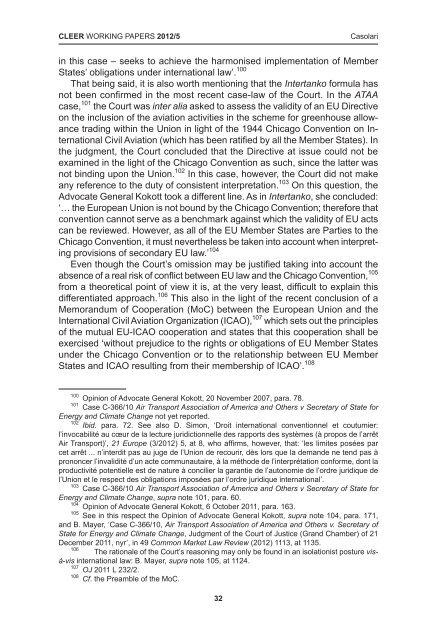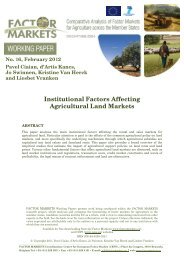CLEER WORKING PAPERS 2012/5Casolariin this case – seeks to achieve the harmonised implementation <strong>of</strong> MemberStates’ obligations under international law’. 100That being said, it is also worth mentioning that the Intertanko formula hasnot been confirmed in the most recent case-law <strong>of</strong> the Court. In the ATAAcase, 101 the Court was inter alia asked to assess the validity <strong>of</strong> an <strong>EU</strong> Directiveon the inclusion <strong>of</strong> the aviation activities in the scheme for greenhouse allowancetrading within the Union in light <strong>of</strong> the 1944 Chicago Convention on InternationalCivil Aviation (which has been ratified by all the Member States). Inthe judgment, the Court concluded that the Directive at issue could not beexamined in the light <strong>of</strong> the Chicago Convention as such, since the latter wasnot binding upon the Union. 102 In this case, however, the Court did not makeany reference to the duty <strong>of</strong> consistent interpretation. 103 On this question, theAdvocate General Kokott took a different line. As in Intertanko, she concluded:‘… the European Union is not bound by the Chicago Convention; therefore thatconvention cannot serve as a benchmark against which the validity <strong>of</strong> <strong>EU</strong> actscan be reviewed. However, as all <strong>of</strong> the <strong>EU</strong> Member States are Parties to theChicago Convention, it must nevertheless be taken into account when interpretingprovisions <strong>of</strong> secondary <strong>EU</strong> law.’ 104Even though the Court’s omission may be justified taking into account theabsence <strong>of</strong> a real risk <strong>of</strong> conflict between <strong>EU</strong> law <strong>and</strong> the Chicago Convention, 105from a theoretical point <strong>of</strong> view it is, at the very least, difficult to explain thisdifferentiated approach. 106 This also in the light <strong>of</strong> the recent conclusion <strong>of</strong> aMemor<strong>and</strong>um <strong>of</strong> Cooperation (MoC) between the European Union <strong>and</strong> theInternational Civil Aviation Organization (ICAO), 107 which sets out the principles<strong>of</strong> the mutual <strong>EU</strong>-ICAO cooperation <strong>and</strong> states that this cooperation shall beexercised ‘without prejudice to the rights or obligations <strong>of</strong> <strong>EU</strong> Member Statesunder the Chicago Convention or to the relationship between <strong>EU</strong> MemberStates <strong>and</strong> ICAO resulting from their membership <strong>of</strong> ICAO’. 108100 Opinion <strong>of</strong> Advocate General Kokott, 20 November 2007, para. 78.101 Case C-366/10 Air Transport Association <strong>of</strong> America <strong>and</strong> Others v Secretary <strong>of</strong> State forEnergy <strong>and</strong> Climate Change not yet reported.102 Ibid. para. 72. See also D. Simon, ‘Droit international conventionnel et coutumier:l’invocabilité au cœur de la lecture juridictionnelle des rapports des systèmes (à propos de l’arrêtAir Transport)’, 21 Europe (3/2012) 5, at 8, who affirms, however, that: ‘les limites posées parcet arrêt ... n’interdit pas au juge de l’Union de recourir, dès lors que la dem<strong>and</strong>e ne tend pas àprononcer l’invalidité d’un acte communautaire, à la méthode de l’interprétation conforme, dont laproductivité potentielle est de nature à concilier la garantie de l’autonomie de l’ordre juridique del’Union et le respect des obligations imposées par l’ordre juridique international’.103 Case C-366/10 Air Transport Association <strong>of</strong> America <strong>and</strong> Others v Secretary <strong>of</strong> State forEnergy <strong>and</strong> Climate Change, supra note 101, para. 60.104 Opinion <strong>of</strong> Advocate General Kokott, 6 October 2011, para. 163.105 See in this respect the Opinion <strong>of</strong> Advocate General Kokott, supra note 104, para. 171,<strong>and</strong> B. Mayer, ‘Case C-366/10, Air Transport Association <strong>of</strong> America <strong>and</strong> Others v. Secretary <strong>of</strong>State for Energy <strong>and</strong> Climate Change, Judgment <strong>of</strong> the Court <strong>of</strong> Justice (Gr<strong>and</strong> Chamber) <strong>of</strong> 21December 2011, nyr’, in 49 Common Market Law Review (2012) 1113, at 1135.106The rationale <strong>of</strong> the Court’s reasoning may only be found in an isolationist posture visà-visinternational law: B. Mayer, supra note 105, at 1124.107 OJ 2011 L 232/2.108 Cf. the Preamble <strong>of</strong> the MoC.32
The principle <strong>of</strong> loyal co-operation: A ‘master key’ for <strong>EU</strong> <strong>external</strong> <strong>representation</strong>?That being said, <strong>and</strong> leaving aside the question <strong>of</strong> whether the Intertankoapplication <strong>of</strong> the consistent interpretation doctrine will be confirmed in thefuture, it remains in any case that such a tool could indirectly affect <strong>EU</strong> <strong>external</strong><strong>representation</strong>. In fact, it is possible to maintain that the interpretative dutiesset out in Intertanko should also apply in cases where the <strong>EU</strong> institutions implementthe international instruments binding the Union. In this respect, despiteits limits, 109 the principle <strong>of</strong> consistent interpretation expresses a tw<strong>of</strong>old function.First, it contributes to minimize the conflicts between the <strong>EU</strong> internationalcommitments <strong>and</strong> other sources <strong>of</strong> international law; secondly, inasmuch as ithighlights the importance <strong>of</strong> the international obligations assumed by each <strong>of</strong>the 27 Member States, the principle could represent an effective remedy to theexcessive <strong>EU</strong>-oriented interpretation <strong>of</strong> the loyalty clause that has been analysedin the previous sections <strong>of</strong> this paper.5. Concluding remarksIn his Opinion in Commission v Sweden, Advocate General Maduro stated that‘[t]he question whether such unity [the unity <strong>of</strong> <strong>representation</strong>] is required bythe duty <strong>of</strong> loyal cooperation can be resolved only by analysing the obligationslaid down in a specific agreement [i.e. only on a case-by-case basis]’. 110 Theabove extract appears to define the flexibility that the loyalty principle may assumein defining the action <strong>of</strong> the Union in the international scene. Such aflexibility is also recognized, as far as Member States’ duties are concerned,by Article 4(3) T<strong>EU</strong>, which states that ‘[t]he Member States shall facilitate theachievement <strong>of</strong> the Union’s tasks <strong>and</strong> refrain from any measure which couldjeopardise the attainment <strong>of</strong> the Union’s objectives’. The provision makes clearthat the loyalty clause may impose positive duties, as well as abstention obligations.The analysis <strong>of</strong> the case-law so far clearly indicates that the loyal cooperationprinciple has become a fundamental tool for ensuring the <strong>external</strong> <strong>representation</strong><strong>of</strong> the Union, <strong>and</strong> results mainstreamed in the <strong>EU</strong> <strong>external</strong> relationsdomain. Of course, the affirmation <strong>of</strong> loyalty duties in the <strong>EU</strong> <strong>external</strong> relationsdoes not represent an ECJ prerogative. Illustrations <strong>of</strong> loyalty duties may alsobe found, indeed, in the Member States’ practice 111 <strong>and</strong> in the <strong>EU</strong> institutions’conduct. 112 It is however apparent that the Court has played a leading role in109 In particular, one has to stress that the application <strong>of</strong> the doctrine <strong>of</strong> consistent interpretationcannot lead to a contra legem interpretation <strong>of</strong> <strong>EU</strong> law.110 Opinion <strong>of</strong> Advocate General Poiares Maduro, supra note 11, para. 37.111 Consider, for instance, the practice <strong>of</strong> inserting disconnection clauses in the internationalagreements concluded by Member States with third parties. c.-p. Economidès, a.-g. Kolliopoulos,‘La clause de déconnexion en faveur du droit communautaire: une pratique critiquable’, 110Revue générale de droit international public (2006) 273, <strong>and</strong> M. ličková, ‘European Exceptionalismin International Law’, 19 European Journal <strong>of</strong> International Law (2008) 463, at 484-489.112 In effect, the <strong>EU</strong> political institutions have developed–both at international <strong>and</strong> internallevel–mechanisms <strong>and</strong> clauses which manage normative conflicts between <strong>EU</strong> law <strong>and</strong> the MemberStates’ international commitments without calling into question the international responsibility<strong>of</strong> Member States vis-à-vis third parties. This paper cannot analyse in detail such a practice. For33CLEER WORKING PAPERS 2012/5
- Page 1: Founded in 2008, the Centre for the
- Page 4 and 5: CLEER WORKING PAPERS 2012/5Gosalbo
- Page 6 and 7: CLEER WORKING PAPERS 2012/5Gosalbo
- Page 8 and 9: CLEER WORKING PAPERS 2012/5Gosalbo
- Page 10 and 11: CLEER WORKING PAPERS 2012/5Blockman
- Page 12 and 13: CLEER WORKING PAPERS 2012/5Blockman
- Page 14 and 15: CLEER WORKING PAPERS 2012/5Casolari
- Page 16 and 17: CLEER WORKING PAPERS 2012/5Casolari
- Page 18 and 19: CLEER WORKING PAPERS 2012/5Casolari
- Page 20 and 21: CLEER WORKING PAPERS 2012/5Casolari
- Page 22 and 23: CLEER WORKING PAPERS 2012/5Casolari
- Page 24 and 25: CLEER WORKING PAPERS 2012/5Casolari
- Page 26 and 27: CLEER WORKING PAPERS 2012/5Casolari
- Page 28 and 29: CLEER WORKING PAPERS 2012/5Casolari
- Page 30 and 31: CLEER WORKING PAPERS 2012/5Casolari
- Page 32 and 33: CLEER WORKING PAPERS 2012/5Casolari
- Page 36 and 37: CLEER WORKING PAPERS 2012/5Casolari
- Page 38 and 39: CLEER WORKING PAPERS 2012/5Casolari
- Page 40 and 41: CLEER WORKING PAPERS 2012/5Van Elsu
- Page 42 and 43: CLEER WORKING PAPERS 2012/5Van Elsu
- Page 44 and 45: CLEER WORKING PAPERS 2012/5Van Elsu
- Page 46 and 47: CLEER WORKING PAPERS 2012/5Van Elsu
- Page 48 and 49: CLEER WORKING PAPERS 2012/5Van Elsu
- Page 50 and 51: CLEER WORKING PAPERS 2012/5Van Elsu
- Page 52 and 53: CLEER WORKING PAPERS 2012/5Van Elsu
- Page 54 and 55: CLEER WORKING PAPERS 2012/5Van Elsu
- Page 56 and 57: CLEER WORKING PAPERS 2012/5Van Elsu
- Page 58 and 59: CLEER WORKING PAPERS 2012/5Van Elsu
- Page 60 and 61: CLEER WORKING PAPERS 2012/5Van Elsu
- Page 62 and 63: CLEER WORKING PAPERS 2012/5Van Voor
- Page 64 and 65: CLEER WORKING PAPERS 2012/5Van Voor
- Page 66 and 67: CLEER WORKING PAPERS 2012/5Van Voor
- Page 68 and 69: CLEER WORKING PAPERS 2012/5Van Voor
- Page 70 and 71: CLEER WORKING PAPERS 2012/5Van Voor
- Page 72 and 73: CLEER WORKING PAPERS 2012/5Van Voor
- Page 74 and 75: CLEER WORKING PAPERS 2012/5Van Voor
- Page 76 and 77: CLEER WORKING PAPERS 2012/5Van Voor
- Page 78 and 79: CLEER WORKING PAPERS 2012/5Van Voor
- Page 80 and 81: CLEER WORKING PAPERS 2012/5Van Voor
- Page 82 and 83: CLEER WORKING PAPERS 2012/5Van Voor
- Page 84 and 85:
CLEER WORKING PAPERS 2012/5Van Voor
- Page 86 and 87:
CLEER WORKING PAPERS 2012/5McArdle
- Page 88 and 89:
CLEER WORKING PAPERS 2012/5McArdle
- Page 90 and 91:
CLEER WORKING PAPERS 2012/5McArdle
- Page 92 and 93:
CLEER WORKING PAPERS 2012/5McArdle
- Page 94 and 95:
CLEER WORKING PAPERS 2012/5McArdle
- Page 96 and 97:
CLEER WORKING PAPERS 2012/5McArdle
- Page 98 and 99:
CLEER WORKING PAPERS 2012/5McArdle
- Page 100 and 101:
CLEER WORKING PAPERS 2012/5McArdle
- Page 102 and 103:
CLEER WORKING PAPERS 2012/5McArdle
- Page 104 and 105:
CLEER WORKING PAPERS 2012/5McArdle
- Page 106 and 107:
CLEER WORKING PAPERS 2012/5Eckeswit
- Page 108 and 109:
CLEER WORKING PAPERS 2012/5Eckesdro
- Page 110 and 111:
CLEER WORKING PAPERS 2012/5Eckesto
- Page 112 and 113:
CLEER WORKING PAPERS 2012/5Eckesare
- Page 114 and 115:
CLEER WORKING PAPERS 2012/5EckesEU
- Page 116 and 117:
CLEER WORKING PAPERS 2012/5Eckeswil
- Page 118 and 119:
CLEER WORKING PAPERS 2012/5EckesPar
- Page 120 and 121:
CLEER WORKING PAPERS 2012/5Eckesthe
- Page 122 and 123:
CLEER WORKING PAPERS 2012/5Eckesise
- Page 124 and 125:
CLEER WORKING PAPERS 2012/5Eckesand
- Page 126 and 127:
CLEER WORKING PAPERS 2012/5Eckesto
- Page 128 and 129:
CLEER WORKING PAPERS 2012/5Eckesarg
- Page 130 and 131:
CLEER WORKING PAPERS 2012/5Wouters,
- Page 132 and 133:
CLEER WORKING PAPERS 2012/5Wouters,
- Page 134 and 135:
CLEER WORKING PAPERS 2012/5Wouters,
- Page 136 and 137:
CLEER WORKING PAPERS 2012/5Wouters,
- Page 138 and 139:
CLEER WORKING PAPERS 2012/5Wouters,
- Page 140 and 141:
CLEER WORKING PAPERS 2012/5Wouters,
- Page 142 and 143:
CLEER WORKING PAPERS 2012/5Wouters,
- Page 144 and 145:
CLEER WORKING PAPERS 2012/5Wouters,
- Page 146:
CLEER WORKING PAPERS 2012/5Wouters,








